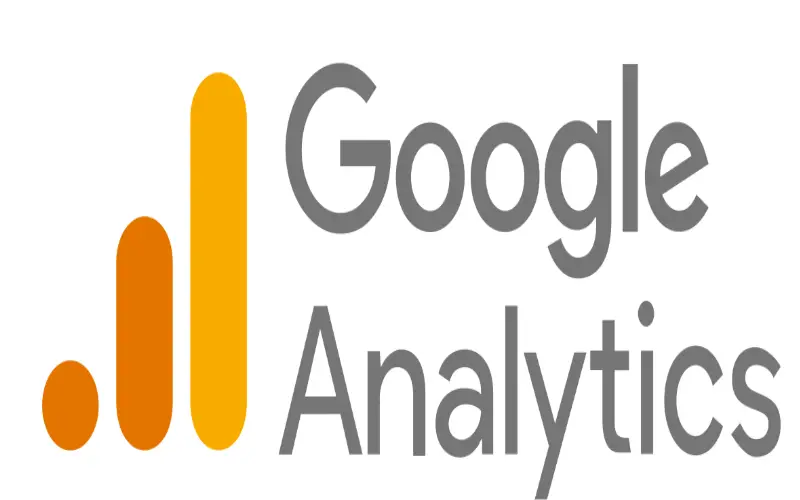
One of the most useful as well as popular tools for keeping track of website performance is Google Analytics. It is a great way for businesses to understand their audience better, get to know how to develop their marketing, and take calculated moves based on the data. Regardless of whether you have a blog, an e-commerce site, or a company website, you need Google Analytics to understand what is working, what is not, and how to improve your online presence.
Without further ado, this guide will explain what Google Analytics is, how it works and why you should care in simple terms. Let’s dive in.
What is Google Analytics?
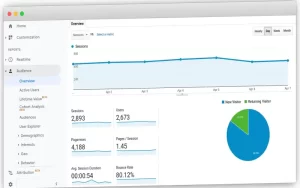
Google Analytics is a free website tracking tool by Google. Website owners can use it to learn how visitors use their website.
It answers questions:
- How many people are using your website?
- From where are your visitors arriving?
- What devices are they using?
- What pages are they spending their time on?
- Do they click a button, sign up, and buy something?
This data will help you make better decisions about what to design for your website, what to put on your website, and marketing strategies.
Why is Google Analytics Important?
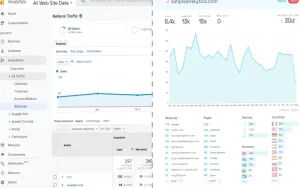
Any modern online business needs Google Analytics to measure growth. Here’s why it’s essential:
- Track Performance
Track how well your website is performing daily, weekly and monthly.
- Understand Your Audience
Find out more about who your visitors are (their age, location, device type, and interests).
- Measure Marketing Results
Find out which marketing channels drive the most traffic: organic search, ads, and social media.
- Optimise Your Website
Discover the landing pages that are converting and the ones with low conversion rates.
- Make Smart Business Decisions
Using those statistics, you can decide when to post or what topics or keywords to focus on for your content, when and how much to commit to advertising, and even what keywords to use for search engine optimisation.
It is astonishing how even a reputed digital marketing company or the top SEO agency in Gurgaon use Google Analytics for strategic analysis and performance evaluation.
How Does Google Analytics Work?
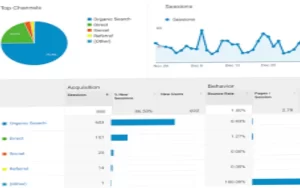
Here is a step-by-step guide on how it is done:
- Tracking Code:
To start with, Google offers a small fragment of HTML code which when inserted on your website, generates the ‘Doodle?’
- Collecting Data:
The following information is gathered the moment a user sets foot on your site: pages viewed, time spent, individual clicks, and type of device.
- Sending to Google Servers:
This information is transferred to the Google Analytics servers and analysed.
- Displaying Reports:
You can access detailed reports and dashboards in the Google Analytics account that you have set up.
Key Features of Google Analytics

To manage your site and improve its performance, Google Analytics provides the following features:
- Real-Time Reports
Monitor what’s happening to your site at the moment, including the number of visitors, the pages visited, their location, and the devices used.
- Audience Reports
Discover the language of your visitors, their age, gender and the technology that they are using.
- Acquisition Reports
Discover what path internet users took to actually end up on your site: through a search engine, shared link from a social network, ads they clicked, or emails that were forwarded with your link.
- Behaviour Reports
See the user activity within it — page views, time spent on the site, bounce rates, etc.
- Conversion Tracking
What is called “goals” tracks actions such as when form submissions, purchases or downloads occur.
These features are commonly utilised by SEO professionals who have SEO consulting services to optimise their SEO and marketing approaches.
How to Set Up Google Analytics (Step-by-Step)
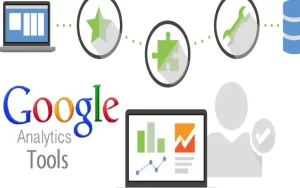
Here are the steps for integrating this analytical tool into your website:
- Create a Google Account
Sign up at analytics.google.com.
- Add a Property
You can add your website as a “property” to your user account via the provided “Dashboard.”
- Install the Tracking Code
Google will provide a tracking ID or code that you can place on your website.
- Place it on Your Site.
This code should be installed directly in the <head> tag of your webpage, or integrated with a plugin, if you use WordPress.
- Verify Installation
Once uploaded, data collection will start, and the data generated can be tracked in the account section conveniently.
Who Uses Google Analytics?
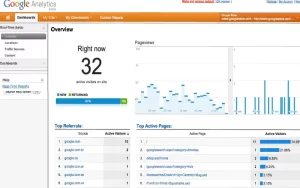
Currently, one can hardly find an online business that does not utilise Google Analytics, whether it is a small-scale enterprise or a multinational company. It’s also widely used by:
- E-commerce stores
- Blogs and content creators
- Nonprofits
- Marketing agencies
- SEO consultants
Each person who is involved in SEO consulting services utilizes Google Analytics in their daily work to ensure the results are heading in the right direction and are effective.
Is Google Analytics Really Free?
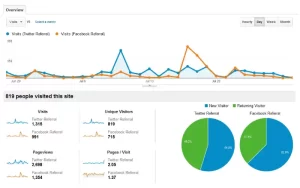
Technically, the basic version is free and adequate for the needs of most business establishments.
There is a paid version known as Google Analytics 360 that includes:
- Advanced Reporting
- More data collection
- Dedicated support
Other related tools that seem to be commonly used by businesses include Google Workspace, which consists of email, Drive, and documents. If you are thinking through it, consider the Google Workspace cost, which will heavily depend on the selected plan.
- Business Starter: ₹125/month per user
- Business Standard: ₹672/month per user
- Business Plus: ₹1,260/month per user
For the latest details on pricing, please visit Google Workspace Pricing.
Being aware of the Google Workspace price is beneficial in preparing for an organisation’s unified digital environment.
Summary
Google Analytics can be considered one of the most effective tools that can be used to analyse visitors to your website and enhance the experience for your business online. It informs and educates you about what is going well, poorly, and where you should be focusing.
Google Analytics is an analytical tool that analyzes your website traffic and behavior to provide comprehensive data that can be useful to anyone from a small business owner, blogger to a marketer who is managing a company’s online presence. However, integrating it with Google Workspace can help build a robust digital workspace — but do bear in mind the Google Workspace cost before subscribing.




